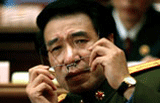Mutual governance of cyberspace called for
Updated: 2014-12-03 12:12
By Chen Weihua in Washington(China Daily USA)
|
||||||||
|
Lu Wei (right), minister of State Internet Information Office, talks to students and faculty at the George Washington University's Elliott School of International Affairs on Tuesday afternoon in a seminar moderated by Philip Crowley, former US assistant secretary of state for public affairs who is now teaching at the George Washington University. Chen Weihua / China Daily |
While the China-US working group on cyber security has been suspended following the US decision in May to indict five People's Liberation Army officers for cyber espionage, bilateral contact seemed to resume in a way as senior officials, scholars and executives from Internet and telecom giants of both countries assembled in Washington on Tuesday.
The 7th China US Internet Industry Forum on Dec 2-3 drew some 150 participants, including Lu Wei, minister of the State Internet Information Office, which manages Internet information in China, and Catherine Novelli, the US under secretary of state for economic growth, energy and the environment.
In his keynote speech, Lu made several suggestions, including that China and the US should appreciate each other instead of engaging in mutual denial.
He cited the fact that China has become the world's largest Internet market with more than 4 million websites, 600 million Internet users and four of the world's top 10 Internet firms. Online commerce is set to hit $2 trillion this year and keep growing at 30 percent a year.
"These achievements are a demonstration of the openness and good governance of China's Internet industry," he said.
Lu pointed out that the two countries should also respect each other instead of engaging in confrontation and accusation. "We should respect each other's cyber sovereignty, Internet governance, major concerns and cultural differences," said Lu, who assumed his post in April of last year.
"The success of the Internet in China over the past two decades shows that successful foreign companies in China respect China's market environment and abide by China's laws and regulations," he said.
The Internet forum was first started seven years ago by Microsoft and the Internet Society of China. This year's meeting focuses on big data cloud service, Internet connectivity, governance and its impact on economic development and social benefits.
Lu called for mutual governance in the cyber world instead of each country serving its own interests. "A responsible major country should never restrain others for its own development, or infringe on other countries' security to protect its own interests," he said.
The 54-year-old former vice-mayor of Beijing believes the two countries should enhance mutual trust instead of suspicion.
"With wisdom and courage, cyber security will not become a source of conflict in China-US relations, but a new bright spot of cooperation," he said.
He proposed that China and the US engage in win-win cooperation instead of zero-sum games.
Lu described the two-decade Internet history in China as 20 years of mutual benefit, win-win and integration with the US and differences should not obstruct bilateral cooperation.
In Lu's views, the bilateral relationship in cyberspace is generally positive despite occasional hurdles.
He described it as "deep fusion and high mutual stakes", citing the examples that half of the profit for Qualcomm, a US telecom giant, as coming from China, and half of the new users of Apple products are in China.
Meanwhile, some 50 Chinese Internet firms are listed in the US, with market capitalization of nearly $500 billion.
In a Tuesday afternoon speech at George Washington University, Lu described the differences between the two countries in the cyber world as only 10 percent of the picture.
He attributed the differences to growing integration. "It is because of the deep integration, more extensive exchanges and closer contact between the Internet industries of China and the US that our differences are easily put under magnifying glasses and spotlight," he said.
While Lu called the deep fusion a reflection of confidence, he said the differences reflect a lack of trust between the two countries which he believes could be improved through more contacts.
For the past years, the US has been accusing China of cyber theft of intellectual property. But the Chinese, like many people and governments in other countries, are deeply concerned over the revelations made by former National Security Agency contractor Edward Snowden of the wide-ranging surveillance activities conducted by the US government.
The Chinese are also frustrated that while the two countries vowed to strengthen cooperation on fighting terrorism in cyber space, the US is often reluctant to label those Uygur separatists who set off bombs in China as terrorists.
Novelli said the two countries are cooperating on a lot of things on the Internet. "There are lots of areas we can work on together," she said.
A former executive at Apple before taking up the current post in February, Novelli said the two countries share a mutual responsibility to build up more broadband access, particularly in the developing world. She described it as directly linked to GDP growth.
She noted that societies and technology need to address problems such as identity theft and child pornography. "Those are things we have to acknowledge that exist and work together to find ways that are effective to address that," she said.
In his talk at George Washington University, Lu told stories about the vibrant Internet industry in Beijing's Zhongguancun, known as China's Silicon Valley. He invited students to visit China's Internet firms there and mingle with the Chinese.
Steven Knapp, president of GW, said he hoped the talk would help contribute to the US-China conversation on the critical cyber topic.
"Cyber is one of the most important topics that we must manage well. And leadership is required in that arena in both Washington and Beijing," he said.
Jiang Qiping, secretary general of the Information Research Center of Chinese Academy of Social Sciences, said the US has been insisting the other countries be completely open in cyberspace, but that would bring huge Internet security concerns.
"I think the Chinese government is doing a good job on insisting on our own internet security criteria."
Zhang Yue contributed to this story.
chenweihua@chinadailyusa.com

 Last artistic flourish in neighborhood to be demolished
Last artistic flourish in neighborhood to be demolished
 Parents 'see' through the eyes of their child
Parents 'see' through the eyes of their child
 Carpenter carves armored vehicle from wood
Carpenter carves armored vehicle from wood
 Reclusive old men in the Qinling Mountains
Reclusive old men in the Qinling Mountains
 Greetings from Tibet
Greetings from Tibet
 A buck to the Year of the Goat
A buck to the Year of the Goat
 China-US Internet Forum in DC
China-US Internet Forum in DC
 Shanghai native creates mini car by hand
Shanghai native creates mini car by hand
Most Viewed
Editor's Picks

|

|

|

|

|

|
Today's Top News
Obama upbeat on future of US-China ties
Opening minds through film
Meet an original Bambi artist, 104
Gay dating app in China gains funding
US startup a good fit for China electronics player
93% of Chinese govt websites have security loopholes: report
2014 likely to be warmest year
Blending of cultures benefits world
US Weekly

|

|








